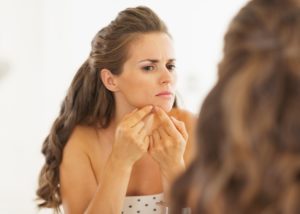
You waited all through your teen years for the breakouts and oily skin to stop and now that you’re an adult, they should be a thing of the past. Right? Well, turns out that’s not exactly the truth for many people, and it’s a hard fact to swallow for most.
Adult acne isn’t uncommon. About 25% of acne sufferers are over age 20. Teens who had acne are prone to becoming adults with the same problem. So what do you do about it? Well, before you can start treating the problem, you need to understand why it’s happening. By getting the underlying cause under control, clear skin will soon be on your horizon.
The Causes of Adult Acne
Hormones
When your hormones change, your skin suffers. Women are most commonly affected by this before their menstrual cycles. With hormone-based acne you’ll commonly find yourself breaking out with deep, painful acne around your neck, back, and chin, often with large and cystic.
Stress
Stress causes strain on your hormones, which causes your skin to produce more oil. Oily skin is a key ingredient to having acne, no matter your age.
Air Pollution
Bacteria trapped deep in your pores is one of the contributors to acne. Adding a layer of pollution and grime to your face is just adding another way to block your pores and hence, another cause of acne. No matter where you live, whether in a busy city or as a hermit in the mountains, there is always some air pollution present. While smog and city-pollution is generally more harmful, even mountain air can clog your pores with dirt. Keeping your skin clean will help keep your skin clear.
Products
Using the wrong products can cause reactions of your skin as well. Not only do some makeup products act like blockages to your pores, but others can cause allergic reactions that end in acne. Pay attention to what products you’re using and how much you’re using of them. Look for ones labeled “non-comedogenic,” oil-free” or “water-based”.
Too Much Cleansing
It’s human nature to want to wash away the acne, and often that leads to over washing. This, however, is the wrong thing to do as it will only dry out your skin. “But that’s a good thing right? Dry skin means no oil!” Wrong. When you dry out your skin, it stimulates your skin to create more oil to compensate. Plus, rubbing your skin exposed it to more bacteria and and potential blockages. Gritty or grainy cleansers can create these problems as well. Over washing can often lead to more acne.
Foods
Everybody reacts differently with different kinds of foods. One person may break out more when eating chocolate, while their sister does not. There are theories that diets high in dairy can lead to increased breakouts. Sugar, has been proven to raise your insulin levels, which in turn triggers your skin to produce oils. Cutting back on free sugars may not just be good for your health, but for your skin as well. Keeping track of what you’re eating and how your skin responds to it is the best way to determine what foods you should remain wary of.
Family History
Some people just have a genetic predisposition for acne. If bad acne runs in the family, this may just be the case for you. You can usually fight this by using softer, gentler soaps. However, if the problem persists, you may want to consider seeing a dermatologist.
Medication
At times, medication side effects can trigger acne. If this is a problem, then you should consult your doctor about changing the medication. If you can’t change prescriptions, then consult your dermatologist, because sometimes medication-based acne doesn’t react the same ways as acne coming from other sources.
Knowing the causes of acne will allow you to fully fight the problem at its cause. There are multiple ways to treat acne, whether it’s by seeing a dermatologist and getting prescribed medication, changing your eating habits and lifestyle, or by changing your soaps and make up. Feel free to contact me to help you make the best decisions for you and your skin,.
Previous Post Next Post